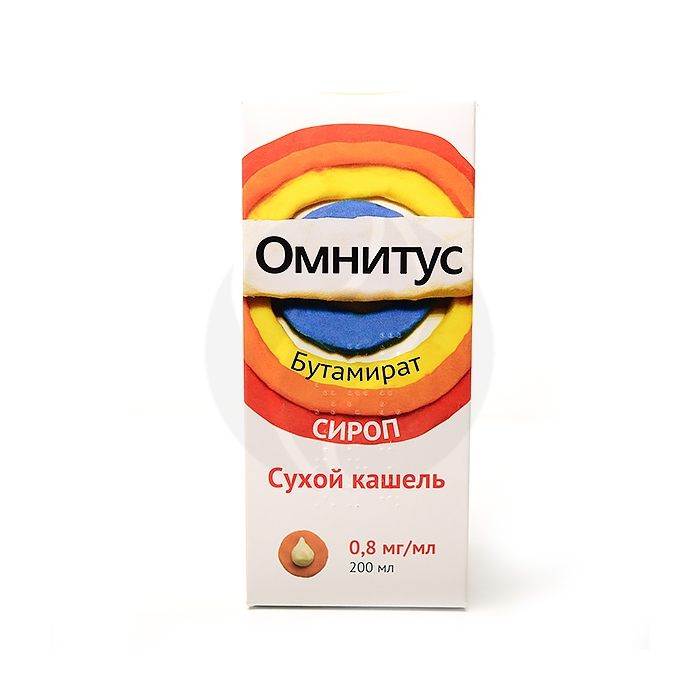Omnitus syrup 0.8mg / ml, 200ml
Expiration Date: 05/2027
Russian Pharmacy name:
Омнитус сироп 0,8мг/мл, 200мл
Dry cough of any etiology (with colds, flu, whooping cough and other conditions);
suppression of cough in the preoperative and postoperative period, during surgical interventions, bronchoscopy.
Syrup
Adults - 6 scoops (30 ml) 3 times a day; children over 9 years old (40 kg) - 3 scoops (15 ml) 4 times a day; from 6 to 9 years old (22-30 kg) - 3 scoops (15 ml) 3 times a day; from 3 to 6 years (15-22 kg) - 2 scoops (10 ml) 3 times a day.
Syrup
1 ml
active substance: butamirate citrate 0.8 mg
excipients: sorbitol 70% (non-crystallizing) - 405 mg; glycerol - 290 mg; sodium saccharinate - 0.6 mg; benzoic acid - 1.15 mg; vanillin - 0.6 mg; anise oil - 0.15 mg; ethanol 96% - 3 ?l; sodium hydroxide - 0.1 mg; purified water - up to 1 ml
Hypersensitivity to the components of the drug;
breastfeeding period;
I trimester of pregnancy;
children under 3 years old (for syrup);
intolerance to fructose (syrup contains sorbitol).
Use the syrup with caution in the II and III trimesters of pregnancy. Due to the presence of ethanol in the OmnitusЃ syrup, the drug should be used with caution in patients with a tendency to develop drug dependence, patients with liver and brain diseases, patients with epilepsy, alcoholism, in the II and III trimesters of pregnancy and in children.
pharmachologic effect
Butamirate, the active substance of OmnitusЃ, is a centrally acting antitussive agent. Neither chemically nor pharmacologically refers to opium alkaloids. Does not form addiction or addiction. Suppresses cough, having a direct effect on the cough center. It has a bronchodilating effect (expands the bronchi). Helps to facilitate breathing, improving spirometry (reduces airway resistance) and blood oxygenation (saturates the blood with oxygen).
Pharmacokinetics
Suction
After oral administration, absorption is high. After ingestion of the drug in the form of a syrup at a dose of 150 mg, Cmax in the plasma of the main metabolite (2-phenylbutyric acid) is observed after 1.5 hours and is 6.4 ?g / ml, when taking a modified-release tablet (50 mg), respectively 9 hours and 1.4 ?g / ml.
Distribution and metabolism
Butamirate is hydrolyzed in blood plasma to 2-phenylbutyric acid and diethylaminoethoxyethanol. These metabolites also have antitussive activity, and, like butamirate, to a large extent (about 95%) bind to plasma proteins, which causes their prolonged T1 / 2.
2-phenylbutyric acid is partially metabolized by hydroxylation in the para position. With repeated administration of the drug, cumulation is not observed.
Withdrawal
T1 / 2 of butamirate when taking the drug in the form of a syrup is 6 hours, in the form of tablets -13 hours. The excretion of three metabolites occurs mainly by the kidneys; after conjugation in the liver, acidic metabolites are largely bound to glucuronic acid.
Side effect
From the side of the central nervous system: rarely - dizziness, drowsiness.
From the digestive system: rarely - nausea, diarrhea.
Allergic reactions: rarely - skin rash, itching, urticaria.
Application during pregnancy and lactation
There is no data on the safety of using the drug during pregnancy and its passage through the placental barrier.
The use of the drug in the first trimester of pregnancy is contraindicated.
In the II and III trimesters of pregnancy, the use of the drug is possible if the expected benefit to the mother outweighs the potential risk to the fetus.
It is not known whether the active substance of the drug or its metabolites penetrates into breast milk; therefore, the use of the drug during breastfeeding is not recommended.
Application in children
Contraindication : children under 6 years of age (20 mg tablets); children and adolescents up to 18 years old (50 mg tablets), for syrup - children up to 3 years old.
special instructions
The syrup contains sorbitol and saccharin as sweeteners, so the preparation in the form of a syrup can be used in patients with diabetes mellitus.
Influence on the ability to drive vehicles and mechanisms
OmnitusЃ can cause dizziness and drowsiness, therefore, during the period of treatment, care must be taken when driving and performing other potentially hazardous activities that require increased concentration of attention and speed of psychomotor reactions.
Overdose
Symptoms: dizziness, drowsiness, nausea, vomiting, diarrhea, impaired coordination of movements, decreased blood pressure.
Treatment: gastric lavage; activated charcoal, saline laxatives, symptomatic therapy (according to indications).
Drug interactions
No drug interactions with butamirate have been described.
During the period of drug treatment, it is not recommended to consume alcoholic beverages, as well as drugs that depress the central nervous system (including sleeping pills, antipsychotics, tranquilizers).
Due to the fact that butamirate suppresses the cough reflex, the simultaneous use of expectorants should be avoided in order to avoid the accumulation of sputum in the respiratory tract with the risk of bronchospasm and respiratory tract infection.

